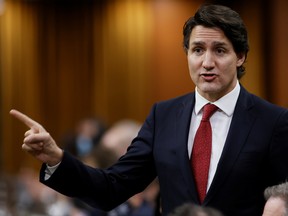Business Worries Justin Trudeau Will Hike Taxes to Pay for Housing Gambit
The Federal Budget: A Balancing Act Between Affordability and Fiscal Responsibility
The Canadian government, led by Prime Minister Justin Trudeau, is set to unveil its ambitious budget aimed at addressing housing affordability concerns and supporting young Canadians. However, a pressing question lingers in the minds of business leaders and economists: will the government raise taxes to fund these initiatives?
A Growing Concern: Deficits and Debt Charges
The government has already announced substantial spending commitments, totaling at least $46 billion, including $17 billion in loans. These measures are aimed at boosting housing supply, supporting artificial intelligence development, and increasing defense spending. However, this increased expenditure has raised concerns about the country’s fiscal sustainability.
Corporate Taxes: A Growing Revenue Source
Corporate taxes have become a significant contributor to government revenues, representing 21% of total revenues in fiscal year 2022-2023. This is the largest proportion on record, dating back to the late 1960s. The Bank of Canada has recently revised its forecast for real GDP growth to 1.5% in 2024, which is likely to contribute positively to tax revenue.
A Cumulative Impact: Government Spending and Inflationary Pressures
While many economists believe that the government’s fiscal plan will not add to inflationary pressures, some provinces have deepened their deficits this year. The cumulative impact of government spending across all levels over time has made the Bank of Canada’s job more challenging.
A Risky Proposition: Straying from Fiscal Budget Anchors
Rachel Battaglia, an economist with Royal Bank of Canada, warns that straying from fiscal budget anchors negatively impacts governments’ credibility and makes their borrowing more expensive. This potentially raises lending risks for bond investors and may lead to a downgrade in the country’s credit rating.
The Federal Government’s Debt-to-GDP Ratio: A Concerning Trend
Canada’s federal government debt is considered AAA by most ratings agencies, but it is at a greater risk of a downgrade than other top-rated peers. Any rise in funding costs will trickle down to businesses and households, making the country more vulnerable to economic shocks.
A Delicate Balance: Affordability vs. Fiscal Responsibility
The Trudeau government’s goal is to reduce interest rates ahead of an expected 2025 election, as affordability issues have contributed to its declining popularity. However, this may not be a feasible goal, given the country’s fiscal constraints and the need for sustainable economic growth.
A Modest but Cumulative Impact: The Budget’s Projections
While some economists expect modest but cumulative impact from government spending in the budget, others believe that the federal government has continued to spend irrespective of economic conditions. This may negatively impact governments’ credibility and make their borrowing more expensive.
Conclusion
The Canadian government faces a daunting task in balancing affordability concerns with fiscal responsibility. The upcoming budget will be a crucial test of the government’s ability to navigate these competing demands while maintaining a sustainable economic growth path.
















